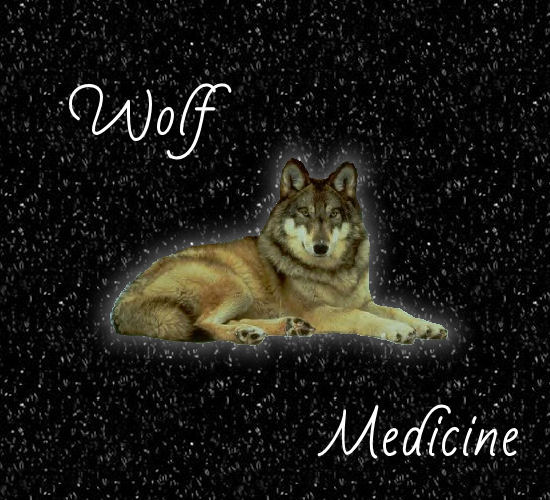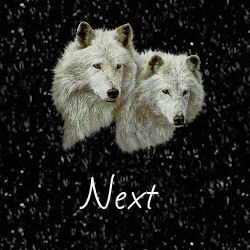|
|

Wolves have been long reguarded by Native Americans as teacher and pathfinders.
If you have "Wolf Medicine" here are the characteristics that apply to you .
Wolves are fiercely loyal to their mates, and have a strong sense of family .
You are loyal to friends, ideals and principals as there is no compromise for you .

In the stars, the Wolf is represented by the Dog, "Sirius," thought by many Native Americans to be the home of the "Ancients."
It is through this connection that the wolf is associated with "ancient teachings.

Wolves are very territorial;
you protect all that is yours and your family's.
You are fearless in your protection, but not careless or reckless.
You plan your strategey carefully, and wait for the most opportune time for the most powerful affect.

Wolves seem to go out of their way to avoid a fight. One is rarely necessary when a shift in posture,
a growl, or a glance gets the point across easily. Someone with wolf medicine has a strong sense of self, communicates well through subtle changes in voice inflection and body movements.

Wolves are "free spirits," even though their packs are highly organized.
Wolves have a strong sense of family and structure; there is no doubt who the elders,
patriarchs and parents are, or about their roles. Disobediance, selfishness and unruly behavior are not tolerated.
There are strong boundries for the young,
they are taught well and carefully.
They often find new solutions to problems while providing stability and support to the family structure.
They work together to accomplish goals,
with everyone moving in harmony and loyality.

Wolves have an relenting sense of adventure;
Exploring new things, stretching out for new horizons. You have a thirst for knowledge and learning new things,
and are eager to share these new learnings which make you a natural teacher.
Your adventure make take you far from home,
but it is esential that you have this base of security to return too.
Wolves have a need to be alone; you are busy being the protector, provider, teacher and trailblazer.
You have a high level of endurance and stamina running for days and never tire.
Their perseverance teach us never to give up,
no matter what the circumstances.

Native Americans call the wolf 'Brother'.
Great warriors, medicine men and chiefs were given their name. So powerful is the wolf medicine,
elite warrior sociteties believed that by donning wolf pelts and making themselves to resemble wolves before riding into the camps of their enemies,
they would be unseen and virtually invincible.

A Crow Medicine Man, "Bird Shirt"
Story Told By "Plenty Coups"
In a battle with Sioux, Cheyenne, and Arapaho near Pyor Creek, Montanna.
A crow named "Swan's Head," took a large bullet square in the chest that tore through his lungs and came out his back.
He held on to his horse, which turned and carried him back to the Crow village.
By the time he arrived, the hourse glistened red with Swan's Head's blood.

Three medicine men, "Hunts to Die," :Wolf Medicine," and "Bird Shirt," believed he could be saved.
Bird Shirt requested that a brush lodge be built next to the river which ran near the camp.
after moving Swan's Head there, he asked for absolute silence.
The people who gathered to watch were pushed back to keep a wide path open from the lodge to the water and told to keep the dogs away.

Bird Shirt took his medicine bundle and entered the lodge.
He took a wolf skin out of the bundle.
"It was a whole wolf skin with the head stuffed."
The legs of the skin were painted red to their first joints and the nostrils and a strip below the eyes were also red.
As Plenty Coups goes on; "I watched Bird Shirt paint himself to look like his medicine skin.
Hig legs to the knees, his arms to their elbows, his nostrils, and strips below his eyes were made red, while he sang steadily with the beating drums.
He Painted his head with clay until it looked like that of the buffalo-wolf, and he made ears with the clay that I could not tell from real wolf's ears, from where I stood.
All the time he was singing his medicine song with the drums while the people scarcely breathed:"

"Suddenly the drums changed their beating.
They were softer and much faster.
I heard Bird Shirt whine like a wolf mother that has young pups, and saw him trot, as a wolf trots, around the body of Swan's Head four times.
Each time he shook his rattle in his right hand,
and each time dipped the nose of the wolf skin in water and sprinkled it upon Swan's Head,
whining continually as a wolf mother whines to make her pups do as she wishes."

"I was watching - everybody near enough was watching - when Swan"S Head sat up.
We then saw Bird Shirt sit down like a wolf, with his back to Swan's Head, and howl four times, just a a wolf howls four times when he is in trouble and needs help.
I could see Swan's Head's eyes open now, so that he could see Bird Shirt stand and lift the medicine wolf skin above his own head four times whining like a wolf mother.
I seemed myself to be lifted with the skin, and each time there was, I saw a change in Swan's Head.
The fourth time Bird Shirt lifted the wolf skin, Swan's Head stood up.
He was bent, his body twisted, but his eyes were clear while Bird Shirt trotted around hm like a wolf, whining still, like a wolf mother coaxing her pup to follow her."

"Bird Shirt walked out of the lodge, and when Swan's Head followed him I could scarcely hear the drums or the men's voices singing his medicine song.
I felt I was with Swan's Head when he stopped once, twice, three times and then into the open way to the water behind Bird Shirt, who kept making the coaxing whine of a wolf mother, until both had stepped into the water."

"Not once all this time had the drums stopped, or the singers, whose voices rose and fell with the drums.
Everybody was watching the two men in the river."

"Bird Shirt led Swan's Head out into the stream until the water covered his wounds.
Then he pawed the water as a wolf does, splashing it over the wounded man's head.
Whining like a wolf, he nosed the water with the wolf skin and made the nose of thw wolf skin move up and down over the bullet holes, like a wolf licking a woound."

"Stretch Yourself, he told Swan's Head; and when Swan's Head did as he was bidden, stretching himself like a man who has been asleep, black blood dripped from the holes in his chest and back.
This was quickly folowed by red blood that colored the water around them, until Bird Shirt stopped it.
Bathe yourself now, said Bird Shirt, and obediently Swan's Head washed his face and hands in the running water.
Then he followed Bird Shirt to the brush lodge where they smoked together. I saw them...."

Thus were wolf and man one...

The "Wolf Star," was red - the color assoicated with the wolf by virtually every tribe, ( red did not siginfy blood; it was simply an esteemed color).

In time the Wolf became associated among the four seasons, with summer, among the trees on the plains with the willow, among the great natural forces with clouds, and the others being wind, thunder and lightening.

Most Indians respected the wolf's prowess as a hunter, especially his ability to always secure game, his stamina, the way he moved smoothly and silently across the landscape.
They were moved by his howling, which they reguarded as talking with the spirit world.
The wolf appears in many of their legends as a messenger in fact, a great long - distance traveler, a guide for anyone seeking the spirit world.

"Blind Bull," for example a Cheyenne shaman, was highly respected among his people before his death in 1885 as one who had learned about things from the comings and goings of wolves, from listening to their howls.
The wolves, for their part, took "Blind Bull's" messages to various places in the real and spiritual world.

With such a strong sense of the interdependence among all creatures and an acute awareness of the ways in which his own life resembled the wolf's, ( hunting for himself, hunting for his family, defending his tribe against enemy attack as the wolf protected the den against the grizzly), the Nataive American turned to the wolf as a paradigm - a mirror reflection.
He wished directly for that power, ("Hear me, Great Spirit ! I wish to be like the Wolf,", and he imitated him by wearing his skin. He wished always to be as well integrated in his environment as he could see the wolf was in the universe.

To fit into the universe, the Native American had to; be strong as an individual, and submerge his personal feelings for the good of the tribe.
In the eyes of many Native Americans, no other animal did this as well as the wolf.
 
Webset by
Angel
| |
|
|
|
|
|